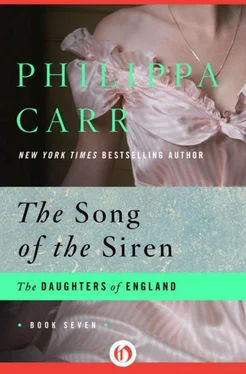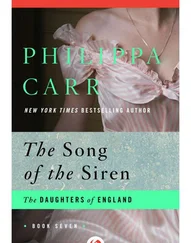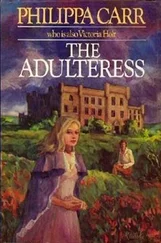“The trouble is,” she once said, “that the wasps come too-and all other kinds of noisome insects. What we have can be the greatest asset a woman can have, but, like most such gifts, wrongly handled it can work against us.” Harriet has never denied herself the intimate society of men and I feel sure that she would have behaved exactly as I did with Beau. She had had her first lover when she was fourteen; it had not been a. passionate love affair but it had provided both her and her lover with advantages and she added when she told me: “Made us both very happy while it lasted, which is what life is meant to do.”
I think I feel closer to Harriet than to anyone-except Beau. After all I had believed Harriet to be my mother for a long time. Harriet was a perfect mother. She never smothered me with affection; she never wanted to know where I had been, how I was getting on with my lessons; she was never anxious about me. I found Priscilla’s obvious anxiety exasperating. I did not want my conscience disturbed by the fears of Priscilla for my welfare-particularly after I met Beau. Harriet was a comforting presence, though. I felt that she would help me if I were in difficulties and she would understand my feelings for Beau as my real mother never could.
I was always welcome at Eyot Abbass, and Benjie was there a good deal. I was rather fond of Benjie. He was Harriet’s son, and for a long time I had believed him to be my brother. I knew he was very fond of me. He was so delighted to discover that I was not his sister, and that seemed to indicate something which I might have found interesting if I had not been so completely absorbed by Beau.
Benjie is a good deal older than I-it must be about twelve years but I know how he feels about me. I became aware of it when Beau became my lover. In fact, I became aware of a good deal then. “You grew up overnight, as they say,” commented Beau, “which means, my dear innocent, that you have ceased to be a child and have become a woman.” Beau laughed at everything; there was so much that he despised; I think he despised innocence so much that he wanted to destroy it. He was quite different from everyone I had ever known. There would never be anyone else to take his place.
He must come back. There must be some explanation. Sometimes when I smelt somewhere the faint musk-like smell-a mixture of scent and sandalwood-it would bring back poignant memories of him. His linen had always been scented with it; he was very fastidious; once when we were at the house he made me undress and he filled a bath with water which he scented with a scent of rose and made me bathe in it; and then he anointed me with the rose-scented lotion, which he said he had made himself; and he was very amused when we made love as though it was some ritual and there was some significance in it.
Harriet talked of him now and then. She did not know of course that he had been at the house. “He’s gone away,” she said. “Forget him, Carlotta.”
I said: “He’ll come back.”
She said nothing but her beautiful eyes were unusually sad.
“Why should he go away?” I demanded.
“Because he decided that it was useless to wait. There was too much opposition.”
“There was no opposition from me.”
“How can we know what took him?” she said. “But the fact remains that he has gone.”
I knew what she was thinking. He had gone abroad. In London, where he was well known in Court circles, it was being said that that was what he had done. When Harriet went to London she had heard that he had disappeared leaving enormous debts. She hinted that he had gone off in pursuit of another heiress. I could not tell even her that we had been meeting at Enderby, that we were making plans to elope.
It was strange how at times I felt so much aware of him. I often went to Enderby and sometimes I would shut myself in the bedroom and lie on the four-poster bed and dream it was all happening again.
I felt an irresistible urge to go there whenever I dreamed of him. That was how I felt after the dream and on the afternoon of the day which followed that night when he had seemed so real to me I rode over to Enderby. It was not very far, ten minutes’ ride at the most. When I used to go to meet Beau I walked over because I didn’t want anyone to see my horse and know that I was there.
On this day I tethered my horse to the post by the mounting block and taking out the key opened the door. I stood in the hall. It was a lovely old place, the vaulted roof was quite magnificent and the panelling on the walls was beautiful; at one end of the hall were the screens, beyond which were the kitchens, and at the other end was the minstrels’ gallery. It was supposed to be the haunted part because one of the owners whose husband had been involved in the Rye House Plot had tried to hang herself over that gallery; the rope was too long and she injured herself and lived in lingering agony afterwards. At least that was the story I heard.
I remember one occasion when I entered. Beau appeared there dressed up in a female costume he had found in the house. He liked to frighten me.
Now as I came in, my eyes immediately went to the gallery. They always did, and I thought, as I had a thousand times, how happy I would be if I could have seen him, if I could have had some indication that he was somewhere, that he would come back for me.
But there was nothing. Just silence and gloom, and that terrible oppressive atmosphere, that sense of brooding evil. I went across the hall, my footsteps ringing out on the stone pavings of the floor, and up the stairs, past the empty gallery.
I opened the door of the bedroom which we had made ours. The bed looked impressive with its velvet hangings. I began to think of the people who had died in that bed; then suddenly I flung myself down on it and buried my face in the velvet bolster.
“Oh, Beau. Beau, where are you?” I cried. “Why did you leave me? Where did you go?”
I started. I sat up in bed. It was as though I had been answered. I knew I was not alone. Someone was in the house. It was a movement. A footstep? Was it a footstep?
I knew the sounds of this house, the creak of the old wood, the protesting groan of a floorboard. I used to be afraid when I lay on this bed with Beau that we would be discovered. How he had laughed at me. I think he rather hoped we would be. Once he said: “I should love to see Prim Priscilla’s face when she saw me in bed with her daughter.” Yes, I did know the sounds of the house and I now had a firm conviction that I was not alone in it.
A wild elation possessed me. My first thought was: He has come back.
”Beau!” I called. “Beau! I’m here, Beau.”
The door opened. My heart leapt and I felt that it would suffocate me.
Then I felt furiously angry. It was my half sister, Damaris, who had come into the room.
“Damaris!” I stammered. “What... what are you doing here?”
My disappointment sickened me and for the moment I hated my sister. She stood there, her lips slightly parted, her eyes round with astonishment; she was not a pretty child; she was quiet, obedient, and had a desire to please, which our mother said was “engaging.” I had always found her rather dull; I ignored her in the main, but now I positively hated her. She looked so neat and clean in her pale blue gown with its sash of a slightly lighter hue and her long brown hair hanging down in loose curls. There was a certain amount of curiosity in her expression which was rapidly replacing the concern.
“I thought someone was with you, Carlotta,” she said. “You were talking to someone, were you not?”
“I called out to know who was there. You startled me.” I frowned at her accusingly.
Her mouth was a round O. She had no subtlety. Perhaps one should not expect it of a child of ten. What had I said? I believed I had called out Beau’s name. Had she noticed it? I felt certain she had never heard of Beau.
Читать дальше








